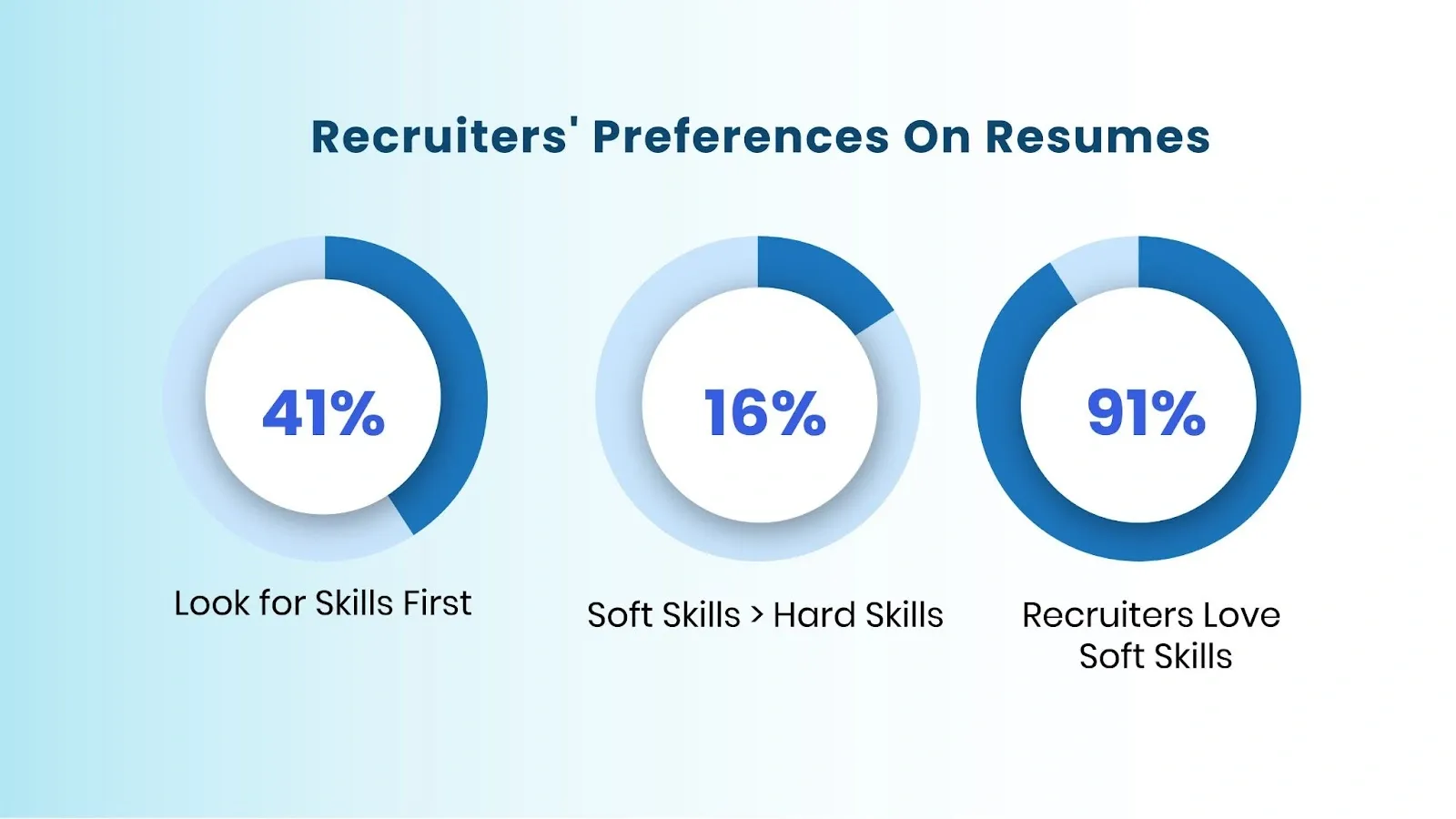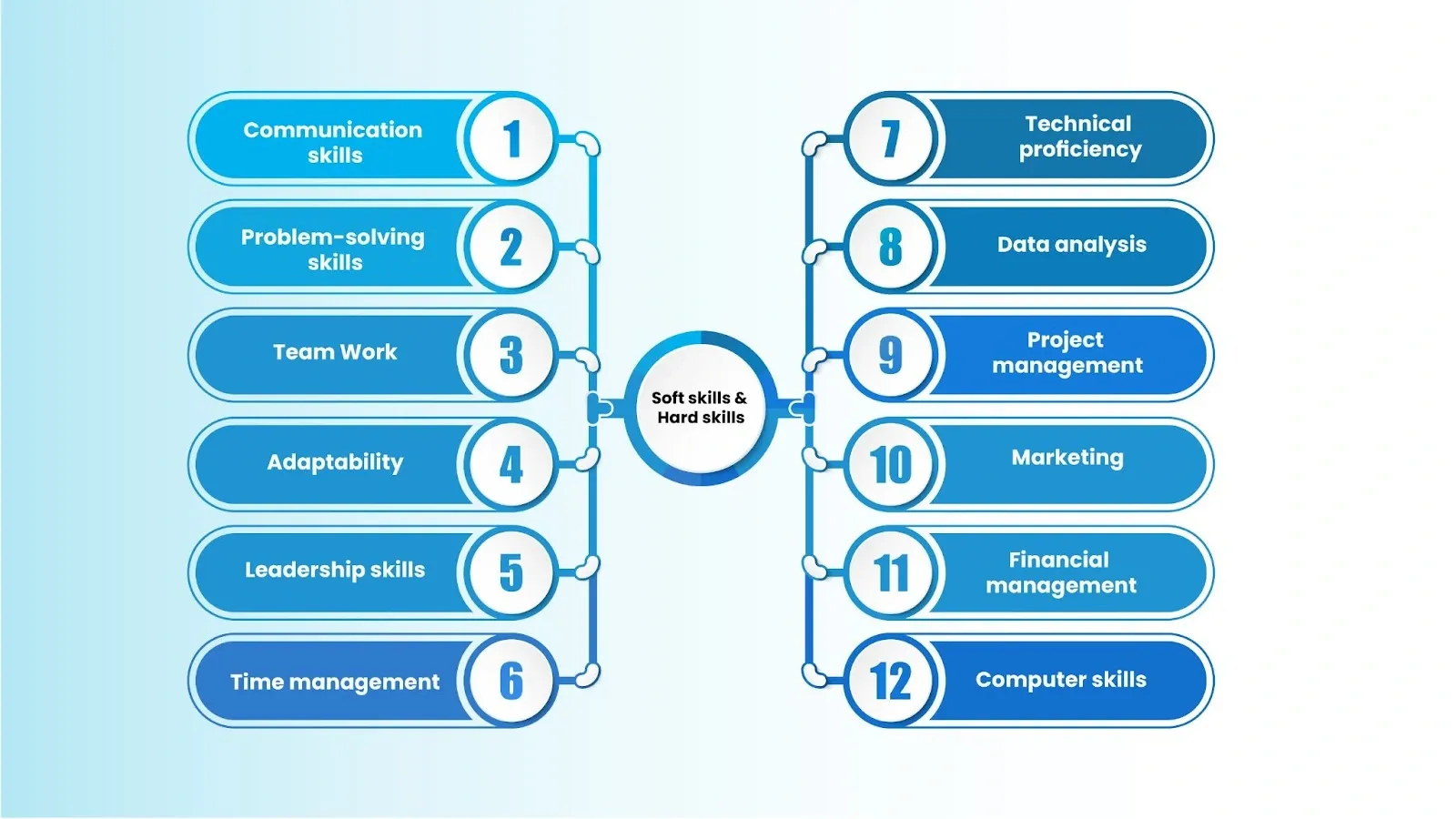Top 12 Resume Skills: Effective Tips for Listing Skills on Your Resume

What makes a resume valuable?
You spend time writing and designing your resume to get your dream job. But while making it look professional and filling in all professional details to make your employers believe you are a perfect fit for the job, you forget about creating a valuable resume.
You may wonder how a resume can be called a valuable resume even if you fill every bit of your professional background and expertise. There is a difference between dumping details and effectively presenting details. It would help if you understood what details on your resume can add significant value to your profile. One such crucial element is listing skills.
And how to write them effectively to make your resume stand out from the crowd. You will find people with resumes up to 3 to 4 pages, but they may not know how to present them effectively.

Before you understand how to list skills in a resume, let’s understand why it is essential to:
- Because around 91% of recruiters prefer seeing soft skills on resumes.
- 41% of recruiters love to see skills at first glance in a resume.
- And 16% of recruiters believe that having soft skills is more critical than having hard skills in a resume.
Now you see how much recruiters love to see skills. People like you try to fill their resume with skills, but they might still fail to get their attention. So, to stand out from the crowd, you need to understand how to list skills in a resume.
Understanding Skills in Resume
Skills in your resume present your abilities and capabilities to perform the assigned task within the deadline and budget. So, while writing skills or choosing skills to write in a resume, understand what skills you should focus on. What sort of skills would the hiring manager be expecting in a resume for the role they are hiring?
There are two board categories of skills that you should focus on while listing your skills:
- Hard skills
- Soft skills
What are Hard Skills?
Hard skills are skills that are learned and improved by practicing them. They also differ between different professions. For example, professionals like architects or doctors will need an extra degree or course to prove their hard skills.
Also, there are some common hard skills, despite the nature of the profession, like time management, critical thinking, and conceptual thinking. Hard skills allow you to prove you have the required knowledge and expertise to perform well in your field.
What are Soft skills?
Soft skills are more like the traits and abilities you carry or develop with experience. Soft skills are interpersonal skills that define how you interact with others. These skills are essential for your resume. Such skills highlight your personality and how you will adapt to the company’s culture.
Unlike hard skills, soft skills are common for all professionals. Some examples of soft skills are communication, teamwork, leadership skills, etc.
You would have understood the meaning and difference between soft skills and hard skills. Let’s know the difference in detail with clear points.
Difference between Hard skills and Soft Skills
Where to Mention Skills in Resume
There are different sections in a resume where you can mention skills in various ways. However, to effectively impact your hiring manager, you need to be specific about how and where to mention your skills in your resume.
Here are two ways to mention skills in your resume:
- Dedicated Skill section of resume: Create a separate skill section of the resume to mention your skills. Even if you are a beginner without tons of skill lists, you can create a separate section and highlight what skills you possess. This separate skill section of resume will quickly grab your hiring authority’s attention at first glance.
- Integrated within the work experience section: Another way to represent your skills is by adding them to your work experience section. In the work experience section, highlight how your skills have helped you in achieving accomplishments. This will create a positive impression.
12 must-have skills for a resume:

Let’s understand the 6 soft skills and 6 hard skills you need to list in your resume to make it stand out.
6 Must-have Soft skills
- Communication skills: Everyone can communicate, but you need to convey the information or message the way it should be transferred. The purpose and meaning of the message should be delivered correctly, both verbally and in writing. Employers value such skills in resumes because they want to ensure effective interaction within the workplace and with clients. This will lead to better collaboration and fewer mistakes.
- Problem-solving skills: The ability to understand challenging situations, identify root causes, and create strategies to tackle or solve them. Employers often look at problem-solving skills as they help you to face any sort of situation and come up with different effective solutions. Such skills include critical thinking and creativity.
- Teamwork: the ability to effectively work with other people at the workplace towards a common goal. Such skills not only help you in working together but also allow you to build a positive work environment. An employer will love to have people who can foster such a working environment.
- Adaptability: An employer would like to have someone at the workplace who is flexible and able to adapt to any change in the working environment or work. Someone who can understand the dynamics of a team, workplace, and any challenging situation and adjust to it accordingly.
- Leadership skills: It doesn’t mean only leading or getting work done by the team. Leadership skills are used to guide and motivate a team to work collaboratively towards a common cause. This allows you to manage all activities and get better outcomes. Employers look for such skills in their resumes, especially those who don’t love getting work done by others effectively.
- Time management: It is the skill of managing allocated time efficiently and effectively at the workplace. It involves prioritizing and managing tasks to meet deadlines on time. It allows you to utilize resources properly, make strategic plans, and effectively get work done.
6 Must-have Hard skills
- Technical proficiency: This skill represents the ability to understand and become an expert in specific software, tools, or programming languages relevant to your field. It is the basic knowledge that an employer will look into the resume.
- Data analysis: it is the process of collecting, possessing, and interpreting data to make meaningful conclusions and judgments. This skill involves knowledge of statistical tools, excel, SQL, and data visualization tools. With these skills, you can make better decisions, understand market trends, and improve the work process.
- Project management: The basic meaning of project management is to plan, execute, and manage the projects one has been assigned. An employer would want someone who can initiate and accomplish project goals within a given deadline and ensure other factors like budget and resource allocation.
- Marketing: the knowledge and expertise in digital marketing, advertising, sales, consumer behavior, and market research. Everything counts as marketing skills. This skill also requires you to know about online tools and software used in marketing. Employers will look for people who can enhance the company’s brand visibility and drive growth, and marketing skills will help in this process.
- Financial management involves knowledge and expertise in budgeting, forecasting, financial analysis, and strategic planning. This skill also requires proficiency with financial software and online tools used in financial planning or management.
- Computer skills: Computer skills encompass proficiency in using various computer systems, including operating systems, Word, Excel, PowerPoint, and basic troubleshooting. Employers value candidates with strong computer skills as they are essential for efficiency, productivity, and effective communication in today’s digital workplace.
Introducing getCREDIBLE: Professional Credibility Builder
getCREDIBLE is an online platform dedicated to enhancing professional credibility. It offers a powerful tool for creating and managing digital resumes that showcase your educational background, work experience, and key accomplishments. A standout feature of getCREDIBLE is its ability to integrate real-time updates and project milestones, allowing professionals to highlight their ongoing growth and achievements in their respective fields.
Key Features of getCREDIBLE
- Slate: In getCREDIBLE, you can build your digital resume, which is referred to as slate. With getCREDIBLE’s interactive dashboards and other features, you can make an effective and attractive resume. Such resumes will boost your professional credibility.
- Feedback Feature: In getCREDIBLE, you can get feedback from your peers and people whom you have added to your professional network on the platform. Based on the input, your ratings will be generated.
- Milestone Feature: Also, you can post your accomplishments and recognitions as milestones in your project. This will also allow you to boost your online profile. Such milestones always create an impact on your professional network.
How getCREDIBLE can help in highlighting your skills in your resume
Enhancing your digital resume and professional credibility is easy with getCREDIBLE’s features, which also help you highlight and improve your skills. Here’s how:
- Feedback Feature: getCREDIBLE allows you to gather feedback from project collaborators on your performance and achievements. This feedback showcases the skills you used to reach your goals and offers a complete picture of your abilities and contributions.
- Milestone Feature: You can add your accomplishments as milestones in your digital portfolio. This feature highlights the skills you employed to achieve these milestones, underscoring your expertise and growth.
Conclusion
Listing your skills in a resume is not only about dumping skills everywhere in the resume but also listing creativity and effectiveness. Present them in such a way that your hiring manager finds your resume unique and suitable for the job role.
With the help of getCREDIBLE, you can build a solid digital profile and highlight your skills in more effective ways with its unique features.
Register today at getCREDIBLE for free and experience the benefits yourself.
